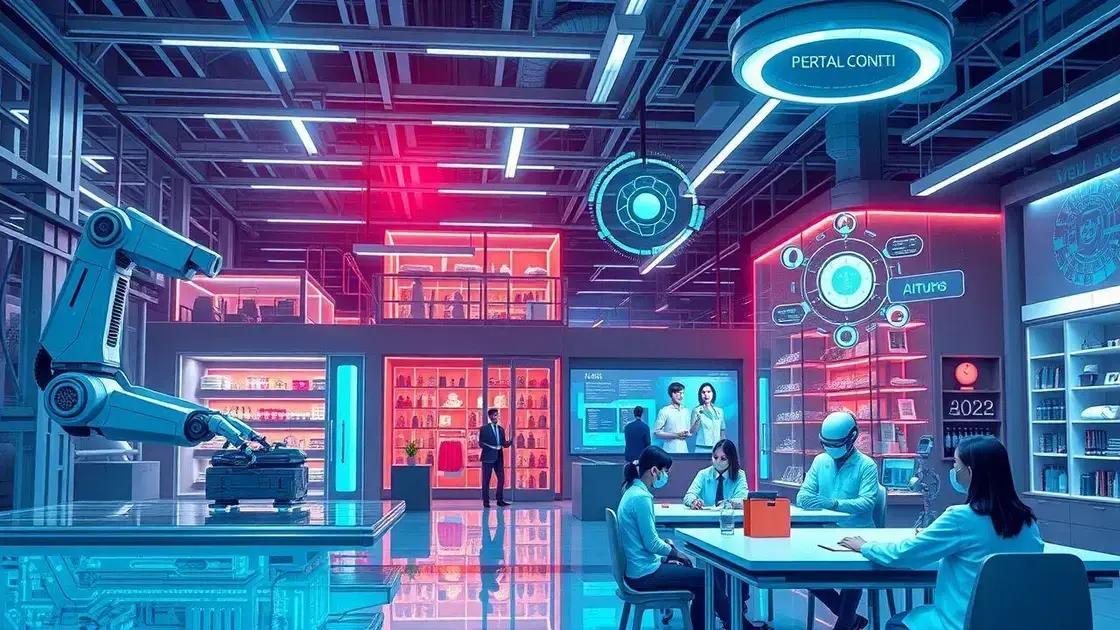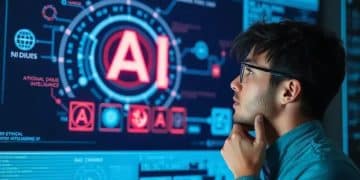Artificial intelligence breakthroughs transforming our world

Anúncios
Artificial intelligence breakthroughs are transforming industries by enhancing automation, personalizing experiences, improving healthcare, and addressing ethical considerations, shaping the future of technology in our daily lives.
Artificial intelligence breakthroughs are reshaping our reality in ways we never imagined. Have you ever wondered how these advances are changing everything from our morning commute to medical diagnostics? Let’s explore the impact together.
Anúncios
Understanding the latest breakthroughs in AI
Understanding the latest breakthroughs in AI can seem daunting, but it’s crucial for grasping how these advancements impact our everyday lives. From healthcare to finance, artificial intelligence breakthroughs are revolutionizing industries.
The role of machine learning
At the core of many AI innovations is machine learning. This technology allows computers to learn from data and improve over time without being explicitly programmed. It is responsible for various applications, such as:
Anúncios
- Predictive analytics that enhances decision-making.
- Personalized recommendations in online shopping.
- Fraud detection algorithms that keep our finances secure.
Each of these applications highlights how machine learning can provide immense value, driving efficiency and innovation. As we explore further, it becomes clear that these advancements are not just tools; they are solutions that can tackle complex problems with unprecedented efficiency.
Natural language processing advancements
Another key area is natural language processing (NLP). This branch of AI enables computers to understand and respond to human language in a meaningful way. As a result, we now see:
- Chatbots that enhance customer service.
- Voice-activated assistants that simplify our daily tasks.
- Translation tools that bridge language barriers.
NLP technologies continually evolve. These improvements facilitate communication, making technology more accessible and user-friendly. Moreover, they exemplify the potential of AI to impact society positively.
Furthermore, robotics is another thrilling domain within AI breakthroughs. Robots are no longer limited to factories; they are increasingly finding roles in healthcare, agriculture, and even our homes. They perform intricate surgeries, assist with farming tasks, and even help with household chores. This expansion showcases AI’s versatility.
As you can see, understanding the latest breakthroughs in AI goes beyond just technology; it involves recognizing how these advancements shape our future. The blend of machine learning, natural language processing, and robotics signifies a transformative era that profoundly affects various aspects of life.
Real-world applications of AI advancements

Real-world applications of AI advancements are transforming how we interact with technology daily. These applications can be seen across various sectors, significantly enhancing efficiency and productivity.
Healthcare innovation
In healthcare, artificial intelligence plays a crucial role. AI-driven tools assist in diagnosing diseases early, analyzing medical images, and predicting patient outcomes. Some examples include:
- AI algorithms that identify cancerous cells in radiology scans.
- Virtual health assistants that manage patient queries round the clock.
- Predictive analytics that anticipate patient needs for timely interventions.
These advancements not only improve patient care but also support medical professionals in making informed decisions.
AI in finance
Similarly, the finance sector benefits greatly from AI. Financial institutions leverage AI to detect fraudulent transactions and automate services. Consider these applications:
- Real-time transaction monitoring systems that flag suspicious activities.
- Chatbots that handle customer service inquiries without human intervention.
- Machine learning models that assess credit risks more accurately.
These tools make processes faster, safer, and more reliable, leading to enhanced customer satisfaction.
Beyond healthcare and finance, AI advancements are evident in transportation. Self-driving cars are becoming a reality, showcasing how AI technology can improve safety and efficiency. Autonomous vehicles use complex algorithms and sensors to navigate, minimizing human error. As this technology evolves, it promises to reshape transportation systems around the world, reducing traffic congestion and accidents.
In retail, AI enhances the shopping experience through personalized recommendations that cater to individual preferences. Retailers utilize AI to analyze consumer behavior and provide tailored suggestions, making shopping not only easier but also more enjoyable. This approach helps businesses increase sales while creating a more engaging customer experience.
Challenges faced by AI innovations
Challenges faced by AI innovations are a hot topic in today’s tech landscape. While advancements in artificial intelligence hold great promise, they also present significant hurdles that developers and companies must navigate.
Ethical concerns
One major challenge is the ethical implications of AI. Decisions made by AI systems can impact lives, raising questions about accountability and fairness. For instance, AI used in hiring might inadvertently favor certain demographics over others. This can lead to biased outcomes, which must be addressed to ensure equity.
- Transparency in AI decision-making is essential for trust.
- Building diverse teams can help reduce biases.
- Continuous monitoring and adjustments are necessary to maintain fairness.
Addressing these ethical concerns is crucial as they can hinder the widespread acceptance of AI technologies.
Data privacy issues
Another significant obstacle is related to data privacy. AI systems often rely on vast amounts of data to function effectively. This creates challenges concerning how data is collected, stored, and used. Customers increasingly demand greater control over their personal information. Companies must find a balance between leveraging data for AI and respecting user privacy.
- Implementing robust data protection policies is vital.
- Clear user consent measures can foster trust.
- Companies should minimize data usage while ensuring AI performance.
These privacy concerns can slow innovation and create barriers for new projects.
Additionally, the technical limitations of AI are a reality that developers face. While AI can process vast amounts of data, it still struggles with tasks requiring complex reasoning. For instance, understanding context in communications or handling ambiguous situations can be tricky. As a result, developers must continue improving algorithms to close these gaps.
Finally, the lack of skilled professionals in the AI field poses another challenge. As demand for AI solutions grows, so does the need for qualified talent. Companies often find it difficult to hire individuals with the right skills, leading to gaps in innovation. Investing in education and training programs is essential to build a future workforce that can support AI advancements.
Future predictions for artificial intelligence

Future predictions for artificial intelligence are exciting and filled with potential. Experts believe that AI will continue to evolve and integrate into our daily lives. As we embrace these changes, it is important to consider the ways AI will shape our world.
Advancements in automation
One key area of growth is in automation. We can expect to see more jobs and processes being handled by AI systems. For instance, in manufacturing, robots will take on complex tasks previously performed by humans. This will lead to:
- Increased efficiency and productivity.
- Reduction in human error.
- Greater consistency in production quality.
As a result, companies can focus more on innovation while AI manages routine tasks.
Enhanced personalization
Additionally, AI will significantly enhance personalization in customer experiences. Businesses will use AI to analyze individual preferences, leading to more tailored services and products. This can be seen in areas such as:
- Personalized marketing strategies that reach consumers more effectively.
- Smart assistants that adapt to user habits and preferences.
- Recommended content that matches personal interests.
Such advancements will create a more engaging and satisfying shopping experience.
Moreover, AI is expected to revolutionize healthcare. Predictive analytics will play a vital role in patient care. Healthcare providers will increasingly use AI systems to identify health risks and suggest preventive measures. This proactive approach can result in better health outcomes for patients while reducing overall healthcare costs.
Education is another field where AI will make a significant impact. Personalized learning experiences will emerge, allowing students to learn at their own pace. AI tools will help teachers identify individual student needs, making education more effective and inclusive.
While the future of AI holds endless possibilities, we must also remain cautious about its ethical implications. As AI systems become more integrated into everyday life, ensuring transparency and fairness will be essential. Addressing these challenges will shape the future landscape of technology and society.
In conclusion, the future of artificial intelligence holds great promise as it continues to evolve and shape many aspects of our lives. From healthcare advancements to personalized education, AI is becoming an essential part of our daily experience. However, it is important to approach these advancements with caution, ensuring ethical considerations are addressed. Embracing change while being mindful of its impact will allow us to harness the benefits of AI effectively.
FAQ – Frequently Asked Questions about Artificial Intelligence
What are the main areas where AI will make a significant impact?
AI is expected to transform various areas, including healthcare, education, finance, and automation, improving efficiency and personalization.
How will automation benefit industries in the future?
Automation will lead to increased productivity, reduced human error, and allow companies to focus more on innovation while AI handles routine tasks.
What ethical considerations should we keep in mind with AI?
It’s important to address issues like accountability, fairness, and transparency to ensure that AI technologies are used responsibly and equitably.
Can AI provide personalized experiences in education?
Yes, AI can tailor learning experiences based on individual student needs, helping educators better support their students.





